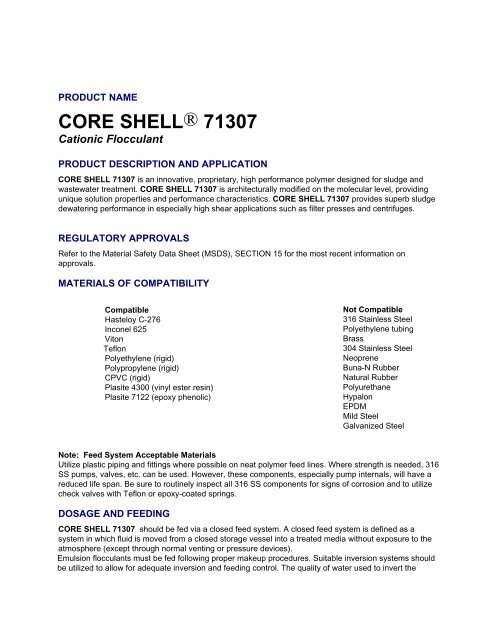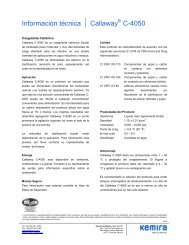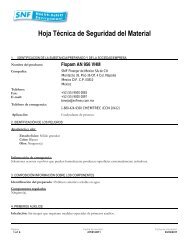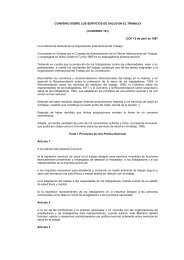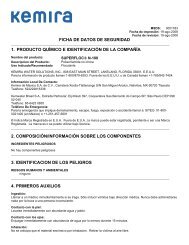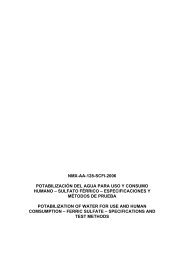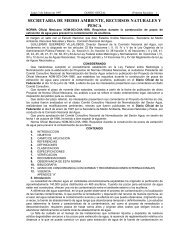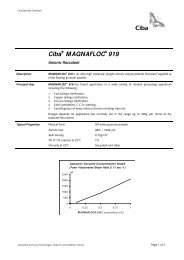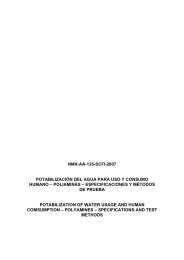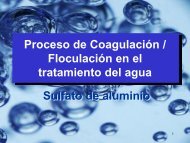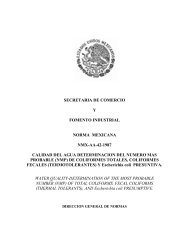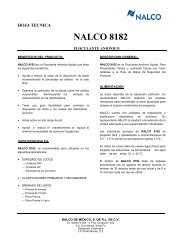CORE SHELL® 71307
CORE SHELL® 71307
CORE SHELL® 71307
You also want an ePaper? Increase the reach of your titles
YUMPU automatically turns print PDFs into web optimized ePapers that Google loves.
PRODUCT NAME<strong>CORE</strong> SHELL® <strong>71307</strong>Cationic FlocculantPRODUCT DESCRIPTION AND APPLICATION<strong>CORE</strong> SHELL <strong>71307</strong> is an innovative, proprietary, high performance polymer designed for sludge andwastewater treatment. <strong>CORE</strong> SHELL <strong>71307</strong> is architecturally modified on the molecular level, providingunique solution properties and performance characteristics. <strong>CORE</strong> SHELL <strong>71307</strong> provides superb sludgedewatering performance in especially high shear applications such as filter presses and centrifuges.REGULATORY APPROVALSRefer to the Material Safety Data Sheet (MSDS), SECTION 15 for the most recent information onapprovals.MATERIALS OF COMPATIBILITYCompatibleHasteloy C-276Inconel 625VitonTeflonPolyethylene (rigid)Polypropylene (rigid)CPVC (rigid)Plasite 4300 (vinyl ester resin)Plasite 7122 (epoxy phenolic)Not Compatible316 Stainless SteelPolyethylene tubingBrass304 Stainless SteelNeopreneBuna-N RubberNatural RubberPolyurethaneHypalonEPDMMild SteelGalvanized SteelNote: Feed System Acceptable MaterialsUtilize plastic piping and fittings where possible on neat polymer feed lines. Where strength is needed, 316SS pumps, valves, etc. can be used. However, these components, especially pump internals, will have areduced life span. Be sure to routinely inspect all 316 SS components for signs of corrosion and to utilizecheck valves with Teflon or epoxy-coated springs.DOSAGE AND FEEDING<strong>CORE</strong> SHELL <strong>71307</strong> should be fed via a closed feed system. A closed feed system is defined as asystem in which fluid is moved from a closed storage vessel into a treated media without exposure to theatmosphere (except through normal venting or pressure devices).Emulsion flocculants must be fed following proper makeup procedures. Suitable inversion systems shouldbe utilized to allow for adequate inversion and feeding control. The quality of water used to invert the
polymer is important. Avoid using plant recycle water or other water sources high in suspended solids,mineral salts and iron, and with a pH either below 6.5 or above 7.8. A dilution aging tank is highlyrecommended, with a minimum of 30 minutes aging in order to gain full product activity. Inverting theemulsion flocculant below a concentration of 0.2, or above a concentration of 0.5%, is not recommended. Apositive displacement pump is recommended for feeding the inverted material to the treatment system.In some cases, continuous dilution of pre-inverted flocculant will enhance activity and generate more costeffectiveresults. Improved performance using dilution water is site specific. To determine if post-dilution isadvantageous, feed inverted product through a standard mixing tee to an active dilution water line. Thewater temperature should be close to ambient and low on suspended solids, mineral salts and iron.In most cases, inverted flocculant should be fed on the discharge side of the feed pump. There may beisolated cases where the additional mixing rendered by distributing the polymer on the suction side of thepump will yield better program results.Bulk viscosity of neat <strong>CORE</strong> SHELL <strong>71307</strong>Temperature [°C]Bulk Viscosity [cp]4 89008 312013 224017 156020.5 1080Solution Viscosity of <strong>CORE</strong> SHELL <strong>71307</strong>% Solution Solution viscosity [cp]0.5 4401.0 9601.5 1560ROI CRITICAL SUCCESS FACTORSValue PropositionReplacement ratio to traditional latex products: 0.8Replacement ratio to dry polymers: 1.3ENVIRONMENTAL AND TOXICITY DATARefer to the Material Safety Data Sheet (MSDS), SECTIONS 11 and 12, for the most current data.SAFETY AND HANDLINGAs with any chemical, <strong>CORE</strong> SHELL <strong>71307</strong> should be handled with responsible care. Refer to the MaterialSafety Data Sheet (MSDS), SECTIONS 3 and 8, for the most current data.In case of small liquid spills: Contain with absorbent material, such as clay, soil or any commerciallyavailable absorbent. Smaller spills can be effectively cleaned up with NALCO POLYCLEAN 7.
STORAGEKeep containers closed and protect from frost and moisture. Low temperatures should be avoided sinceviscosity increases and pumping problems can occur. When frozen, warm the product slowly to ambienttemperature and agitate with a low (


